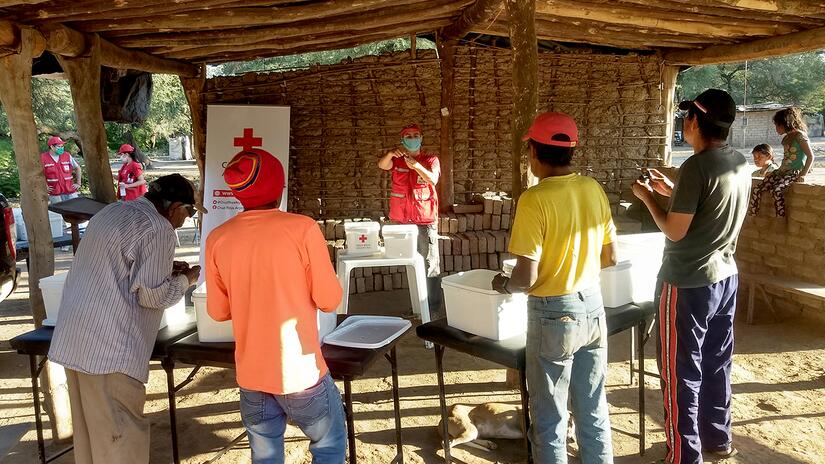The night announces his arrival, and the heat clings to the sand in the last few minutes it has left. And as the sun sets behind the base camp, a Wichi chief, his wife and children are chatting quietly with a couple of Red Cross volunteers who have finished their day and are sitting down to enjoy the moment. The man tells them about his life and what those lands were like decades ago. An area of desert contrasts and an eternal permanence of dry and cold heat always accompanied by the wind. The Wichi community, just like the Toba, Chorote and other ethnic groups in the region, have been the perpetual dwellers of the Province of Salta. In this place, water has always been a concern, but in recent years the situation has become critical.
At the beginning of 2020, the provincial government declared a socio-health emergency. Malnutrition claimed the lives of 8 children, and the lack of vital liquid created serious hygiene complications. According to a study carried out in February by the Humanitarian Observatory of the Argentine Red Cross, 90 per cent of the Wichi populations living in the area have below-normal nutrition, and 84 per cent of the children had diarrhea in the last month.
The Argentine Red Cross has been working in this territory for some years now. It has been a sustained work that has generated a strong link with the members of the community.
"They have been accompanying us for years," said Joaquín, chief of the Quebracho Blanco community. Now we need more people to come and work here. At the beginning of this year, the National Society, with the support of the IFRC, set up a base camp that reaches more than 38 communities. Essentially, primary health care and water and sanitation work has been provided.
A water treatment plant with a capacity of 60,000 litres per day has been installed in this base camp, donated by the Spanish Red Cross. This has significantly helped the population.
"The signs of health have improved, and we can see that people are more hydrated," said Merina Moreno, a volunteer who supports the health in the area and who has been involved in primary care processes for months in Salta. In addition, community filters, jerry cans and 556 family filters have been delivered to 17 communities in the area.
The work has required an enormous effort, even more so with the complications generated by the effects of the COVID-19 pandemic. Due to the isolation measures, the mobilization of teams within the country, and bringing in inputs required from abroad, has taken longer, created delays in the project and increased costs. Something similar is happening with the mobilization of volunteers.
"The distances are enormous, for example, moving a volunteer from Buenos Aires to the camp involves more than 20 hours of travel. Consequently, operational planning had to be adjusted to these times as it involves 4 days of travel, 2 days there and 2 days back," says Abel Martinez, Director of Emergency Response at the Argentine Red Cross. "Due to mental health issues in particular, the volunteers have to stay in the camp for a maximum of 15 days and then are relieved.”
However, optimism and the desire to help are stronger than the complications faced. National Society volunteers find this activity rewarding as they connect with people in the area.
The night ends, and the chief's stories mingle with the warm wind that blows across the desert. The volunteers listen attentively and with a deep sense of satisfaction. They know that this has been another day of positive actions in the community, and that tomorrow they will continue to contribute and learn in one of the most forgotten areas of the country, together with people who receive them with warmth and are willing to work for change in their localities.
Article
World Radio Day: How radio helps keep communities healthy and safe
World Radio Day: How radio helps keep communities healthy and safe
| Article

